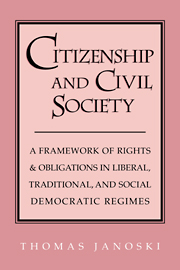 Citizenship and Civil Society
Citizenship and Civil Society Book contents
- Frontmatter
- Contents
- List of Figures and Tables
- Acknowledgments
- 1 Introduction to Citizenship
- 2 The Framing of Citizenship Rights: Expansion, Clarification, and Meaning
- 3 Reconstructing Obligations and Patriotism: Limitations, Sanctions, and Exchange in a System of Rights
- 4 Citizen-Selves in Restricted and Generalized Exchange
- 5 The Balance of Rights and Obligations through Nesting, Civil Society, and Social Closure
- 6 Incremental Change in Citizenship over Decades: Power Resources, State Structures, Ideology, and External Forces
- 7 Momentous Change in Citizenship over Centuries: From Wasps to Locomotives in the Development and Sequencing of Rights
- 8 Conclusion and Implications
- Notes
- References
- Subject Index
- Name Index
2 - The Framing of Citizenship Rights: Expansion, Clarification, and Meaning
Published online by Cambridge University Press: 05 June 2012
- Frontmatter
- Contents
- List of Figures and Tables
- Acknowledgments
- 1 Introduction to Citizenship
- 2 The Framing of Citizenship Rights: Expansion, Clarification, and Meaning
- 3 Reconstructing Obligations and Patriotism: Limitations, Sanctions, and Exchange in a System of Rights
- 4 Citizen-Selves in Restricted and Generalized Exchange
- 5 The Balance of Rights and Obligations through Nesting, Civil Society, and Social Closure
- 6 Incremental Change in Citizenship over Decades: Power Resources, State Structures, Ideology, and External Forces
- 7 Momentous Change in Citizenship over Centuries: From Wasps to Locomotives in the Development and Sequencing of Rights
- 8 Conclusion and Implications
- Notes
- References
- Subject Index
- Name Index
Summary
What are we like?
We are rights-conscious and individualistic, at least as compared to people in the past. There is a central concern with the development of the self and the molding of unique individuals. The core mechanism for constituting the self, according to the prevailing point of view, is through free and unrestrained choice, exercised with regard to many and competitive options.
Lawrence Friedman (1990, p. 5)Strong democracy … rests on the idea of a self-governing community of citizens who are united less by homogenous interests than by civic education and who are made capable of common purpose and mutual action by virtue of their civic attitudes and participatory institutions rather than their altruism or their good nature.
Benjamin Barber (1984, p. 117)Citizenship rights are at the same time indisputable and subject to extension, and controversial and an object of curtailment. Some see freedom as maximized through market choices made by individuals (Friedman 1990), while others see freedom requiring the community to combine peoples' efforts through discourse in common purpose (Barber 1984). To understand citizenship rights within this broad range of opinion, this chapter surveys, analyzes, and frames rights under citizenship as universalistic rights enacted into law, and not informal, unenacted, or particularistic rights.
This chapter will establish the logic of citizenship rights through five points. First, it establishes the range of rights in T. H. Marshall's theory. Second, Marshall and Bendix use citizenship rights in an implied cross-classification of action (active and passive) and arenas (political and economic), which undergirds their theory.
- Type
- Chapter
- Information
- Citizenship and Civil SocietyA Framework of Rights and Obligations in Liberal, Traditional, and Social Democratic Regimes, pp. 28 - 51Publisher: Cambridge University PressPrint publication year: 1998


